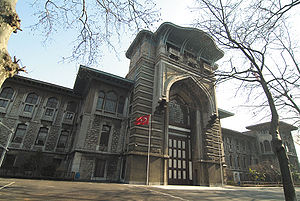
Ottoman Public Debt Administration
Encyclopedia

Turkish language
Turkish is a language spoken as a native language by over 83 million people worldwide, making it the most commonly spoken of the Turkic languages. Its speakers are located predominantly in Turkey and Northern Cyprus with smaller groups in Iraq, Greece, Bulgaria, the Republic of Macedonia, Kosovo,...
: Düyun-u Umumiye-i Osmaniye Varidat-ı Muhassasa İdaresi, or simply Düyun-u Umumiye as it was popularly known), was a European-controlled organization that was established in 1881 to collect the payments which the Ottoman Empire
Ottoman Empire
The Ottoman EmpireIt was usually referred to as the "Ottoman Empire", the "Turkish Empire", the "Ottoman Caliphate" or more commonly "Turkey" by its contemporaries...
owed to European companies in the Ottoman public debt
Ottoman public debt
The Ottoman public debt was a term which dated back to 4 August 1854, when the Ottoman Empire first entered into loan contracts with its European creditors shortly after the beginning of the Crimean War. The Empire entered into subsequent loans, partly to finance railway construction and partly to...
. The OPDA became a vast, essentially independent bureaucracy within the Ottoman bureaucracy, run by the creditors. It employed 5,000 officials who collected taxes that were then turned over to the European creditors. The OPDA played an important role in Ottoman financial affairs. Also, it was an intermediary with European companies seeking investment opportunities in the Ottoman Empire. In 1900, the OPDA was financing many railways and other industrial projects. The financial and commercial privileges of the non-Muslim foreigners were protected with the capitulations of the Ottoman Empire
Capitulations of the Ottoman Empire
Capitulations of the Ottoman Empire were contracts between the Ottoman Empire and European powers, particularly France. Turkish capitulations, or ahdnames, were generally bilateral acts whereby definite arrangements were entered into by each contracting party towards the other, not mere...
.
Further reading
- Birdal, Murat. "The Political Economy of Ottoman Public Debt: Insolvency and European Financial Control in the late Nineteenth Century." 2010.

